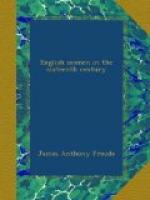The deadly hail rained on. In some ships blood was seen streaming out of the scupper-holes. Yet there was no yielding; all ranks showed equal heroism. The priests went up and down in the midst of the carnage, holding the crucifix before the eyes of the dying. At midday Howard came up to claim a second share in a victory which was no longer doubtful. Towards the afternoon the Spanish fire slackened. Their powder was gone, and they could make no return to the cannonade which was still overwhelming them. They admitted freely afterwards that if the attack had been continued but two hours more they must all have struck or gone ashore. But the English magazines were empty also; the last cartridge was shot away, and the battle ended from mere inability to keep it up. It had been fought on both sides with peculiar determination. In the English there was the accumulated resentment of thirty years of menace to their country and their creed, with the enemy in tangible shape at last to be caught and grappled with; in the Spanish, the sense that if their cause had not brought them the help they looked for from above, the honour and faith of Castile should not suffer in their hands.
It was over. The English drew off, regretting that their thrifty mistress had limited their means of fighting for her, and so obliged them to leave their work half done. When the cannon ceased the wind rose, the smoke rolled away, and in the level light of the sunset they could see the results of the action.
A galleon in Recalde’s squadron was sinking with all hands. The San Philip and the San Matteo were drifting dismasted towards the Dutch coast, where they were afterwards wrecked. Those which were left with canvas still showing were crawling slowly after their comrades who had not been engaged, the spars and rigging so cut up that they could scarce bear their sails. The loss of life could only be conjectured, but it had been obviously terrible. The nor’-wester was blowing up and was pressing the wounded ships upon the shoals, from which, if it held, it seemed impossible in their crippled state they would be able to work off.




